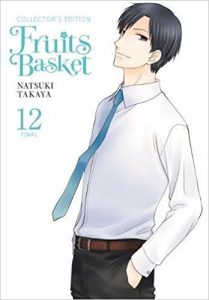By Natsuki Takaya. Released in Japan by Hakusensha, serialization ongoing in the magazine Bessatsu Hana to Yume. Released in North America by Yen Press. Translated by Alethea and Athena Nibley.
There are some stories that cry out for sequels, leaving loose ends and plotlines that would easily carry a new series forward with exciting, fresh ideas. Then there are series that ended nearly perfectly, with pretty much everything resolved, and the idea of a sequel fills you with foreboding and a sense that it’s going to ruin the franchise. Such a series, I’m afraid, it’s Fruits Basket another, the next-generation sequel to one of the most beloved manga of all time. Note I said next-gen: apart from one or two minor characters in small roles (Hanajima’s brother is a teacher, for example), don’t expect any of the original cast in this first volume. Instead we see the sons and daughters of Sohma, who are blissfully not cursed, happy and content, and living the good life at the same high school their parents went to. There’s even a Sohma fan club run by the daughter of the Yuki fan club president. Into this lovely arrangement comes Sawa, our heroine.
The late, lamented Sayonara, Zetsubou-sensei introduced a girl named Ai Kaga, who thinks everything that she does is a bother to someone else and makes her feel tremendous guilt. It’s meant to be a parody. That said, if you took Ai and made her 100% serious, you’d come close to Sawa in this first volume. Sawa lives alone with her mother, whose absence is hinted to veer towards actual neglect. She suffers from amazingly low self-esteem, not helped by various childhood incidents that have only reinforced it. Now she’s in high school, but she’s late her first day because her landlord yelled at her for something that’s her mother’s fault. If Tohru was a ray of sunshine and hope into everyone’s lives, then Sawa is a black cloud floating overhead. Fortunately, she soon runs into Mutsuki and Hajime Sohma, the sons of Yuki and Kyo respectively. Soon she’s blackmailed into being on the Student Council and hanging out with more and more Sohmas, incurring the wrath of the girls of the school even as she wonders “why her?”.
The biggest question I have with this series is “why was it written?”. No, seriously. What new story needed to be told here beyond “oh look, Sohma kids!”? If Fruits Basket sometimes felt a bit like “every new Sohma gets to reveal their backstory and angst before being healed by the power of Tohru”, this is meant to be the exact opposite – despite the occasional stab at Mutsuki and Hajime having a “rivalry”, the fact is that the next-gen Sohmas are happy and content. Which is good, y’know, because we don’t exactly want to Fruits Basket main characters to be horrible parents, but it’s also fairly boring. As for Sawa, you can tell that Takaya is trying not to simply write Tohru Mk. 2, but her self-hatred really is through the roof – she’s not plucky like Tohru (or, for that matter, Sakuya and Liselotte) and so she simply grates.
There is a hint in the cliffhanger ending that we may see a Sohma who is not happy and content (Shigure and Akito’s kid – gosh, what a surprise), but for the most part the first volume of Fruits Basket another commits the cardinal sin of being deadly boring. And while normally I wouldn’t be pissed off about that sort of thing, the fact that it’s a sequel to one of my favorite shoujo series AND it’s also put Liselotte & Witch’s Forest (which I’d rather be reading) on hiatus just makes me more annoyed. If you loved the original Fruits Basket, preserve your memories and give this half-baked sequel a miss.



